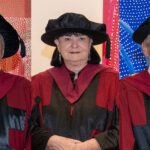The National Health and Medical Research Council has named a Curtin University duo in its annual list of the country’s leading researchers, for developing new surgical hardware which could dramatically improve results for patients.
Adjunct Senior Research Fellows — and wife and husband — Dr Intan Oldakowska and Dr Matthew Oldakowski have developed a new surgical screw to be used when repairing bone fractures, which saw the NHMRC name the pair in its prestigious 10 of the Best publication.
In collaboration with surgeons and bioengineers from Royal Perth and St John of God Hospitals, Dr Oldakowska and Dr Oldakowski created the REX Screw which is strong and expandable, yet also easy to remove if required.
The titanium screw has a retractable spreading-arm mechanism which increases strength of the connection between the screw and bone.
This in turn reduces the possibility of the screw loosening and requiring a second surgery to fix. This leads to a better outcome for the patient, reducing the likelihood of them losing independence.
Dr Oldakowski said they created the REX Screw to address key issues surgeons and patients faced with the existing screws commonly used in fracture surgery.
“Currently, surgeons have the option of traditional surgical screws which can become loose over time leading to repeat surgery, or expandable screws which stay fixed but can be difficult or impossible to remove when required,” Dr Oldakowski said.
The REX Screw provides a solution to these challenges and could have a particularly significant impact for patients who experience hip fractures – the most common fracture requiring surgery.
Dr Oldakowska said screw failures can lead to a loss of independence, disability and even death in hip fracture patients.
“About one in three adults aged over 50 die within 12 months of suffering a hip fracture and 40 per cent never return to pre-fracture mobility,” Dr Oldakowska said.
“Improving surgery results and reducing complications will have significant benefits for patients and for the hospital system by reducing unnecessary surgeries and making better use of resources.”
Dr Oldakowska and Dr Oldakowski first began work on the REX Screw while completing their PhD studies at Curtin under supervisors Professor Brett Kirk and Professor Garry Allison
Their invention was the recipient of a highly coveted Curtinnovation Award.
They co-founded REX Ortho along with seasoned entrepreneur, Ian Brown which has since attracted external investment and a partnership with the world’s largest network of orthopaedic surgeons, the AO Foundation.
The NHMRC’s 10 of the Best publication highlights Australian researchers and their teams who are adding to our understanding of health by addressing major health challenges.
Curtin University Deputy Vice-Chancellor, Research Professor Melinda Fitzgerald said Dr Oldakowska and Dr Oldakowski were worthy of the honour.
“The REX Screw is a wonderful example of creative thinking leading to a product which can benefit people in Australia and across the world,” Professor Fitzgerald said.
“The Curtin community is proud of Dr Oldakowska and Dr Oldakowski for this national recognition and we’re sure they will have many more achievements in the future.”
NHMRC chief executive Professor Steve Wesselingh announced Dr Oldakowska and Dr Oldakowski’s project was featured in the Fifteenth Edition of the NHMRC’s 10 of the Best, at the annual NHMRC Research Excellence Awards Dinner in Canberra.
Professor Wesselingh said the pair was part of a large field of quality candidates.
“The stories are carefully reviewed by the NHMRC’s Internal Scientific Panel and choosing the 10 isn’t easy, given how many fantastic projects there are out there,” Professor Wesselingh said.
“We look forward to seeing Dr Oldakowska and Dr Oldakowski’s exciting research continue towards a first-in-human clinical trial.”



